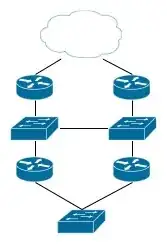I am going to have to use HSRP for WAN failover with my two routers since a routing protocol is not being offered. In order to make sure my active router doesn't get out of sync with their active router should any router fail, the best thing I have come up with is two put two trunked switches between my router's and the provider's to make sure if one goes out, the active routers don't get out of sync.
Here is a diagram I found that basically illustrates the setup (So I am talking about the switches between the routers):

(source: ciscoblog.com)
Anyways, can anyone recommend the cheapest cisco model for this? I will want to be able to to have multiple connections between the switches to reduce the risk of split brain, and will need one with solid STP. Also, I would like it if I can have redundant power from a RPS 2300 for each of them. I would also be open to Power-Connect options that work with the the dell rps-600 redundant power.